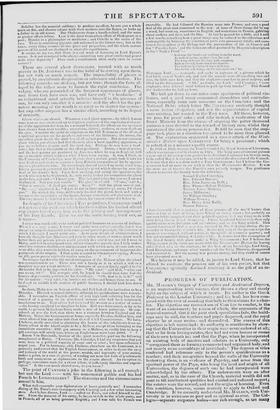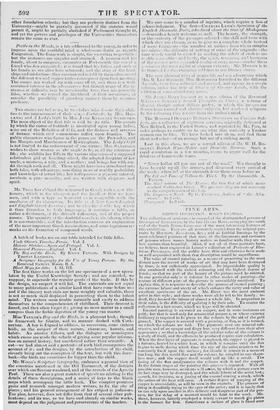PROGRESS OF PUBLICATION.
Tvlit. MALDEN'S Origin of Universities and Academical Degrees, is an unpretending little volume, that throws a clear and steady light on the subject of which it treats. Its author is the Greek Professor in the London University ; and his book has been com- posed with the view of assisting that body in their claims for a char- ter. The objection our recreant son of Cam Las to combat, is the want of an endowment; by reason of which, the opponents of the demand contend, that if the joint stock speculation fails, the build- ings may be sold, the teachers and pupils dispersed, and the royal charter be at once useless and discredited. The reason of this objection is left untouched: its authority is overthrown by show- ing that the Universities in their origin were never endowed at all; that so far from having estates, they hall not even houses or rooms of their own to teach ill; and that the Pope, when he incorporated an existing body of masters and scholars as a University, only "recognized them as forming a connected and organized body, and not merely as an assemblage of invividuals.- The degrees or titles conferred had reference only to the person's qualifications as a teacher; and their recognition beyond the walls of the University bestowing them, is an evidence of Papistry, and arose from the spiritual power of the Pope, who being the head and origin of all Universities, the degrees of each one lie had incorporated were acknowledged by the others. The endowments were an after matter, and, as in the case of the Church, material wealth did not pour in till intellectual qualities had excited and enforced respect; the estates were the reward, and nut the origin of learning. Evert this condition, however, seems scarcely to apply to Oxford and Cambridge. If we correctly understand Mr. MALDEN, each Uni- versity is in strictness as poor and as spiritual as ever. The Col- leges—separate corporate bodies—are rich enough, as.ale Wag
other foundation schools; but they are perfectly distinct from the University—might be partially increased if the statutes would permit it, might be partially abolished if Parliament thought fit, and yet the powers and privileges of the Universities themselves remain the same as ever.



























 Previous page
Previous page